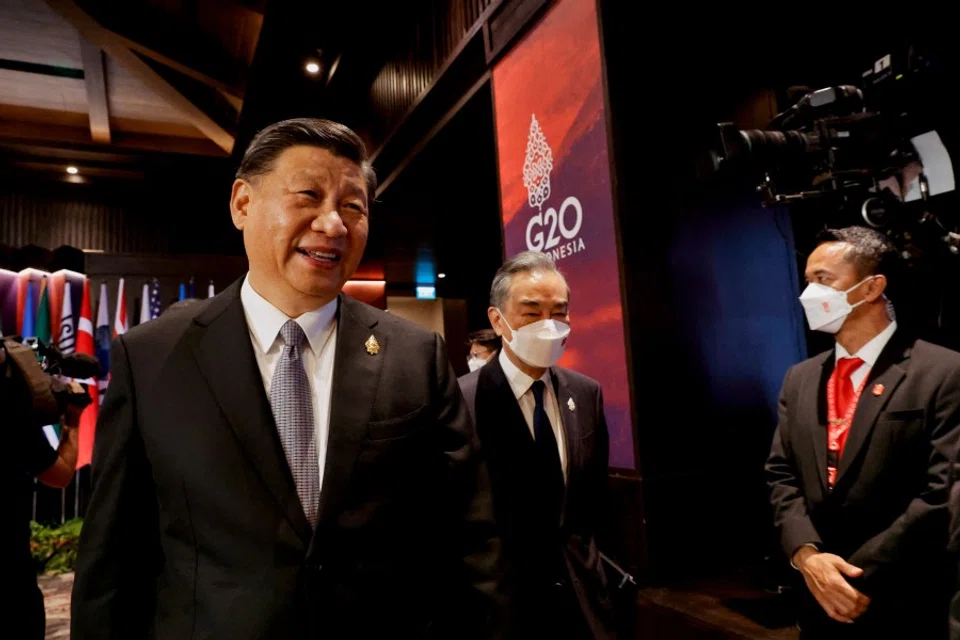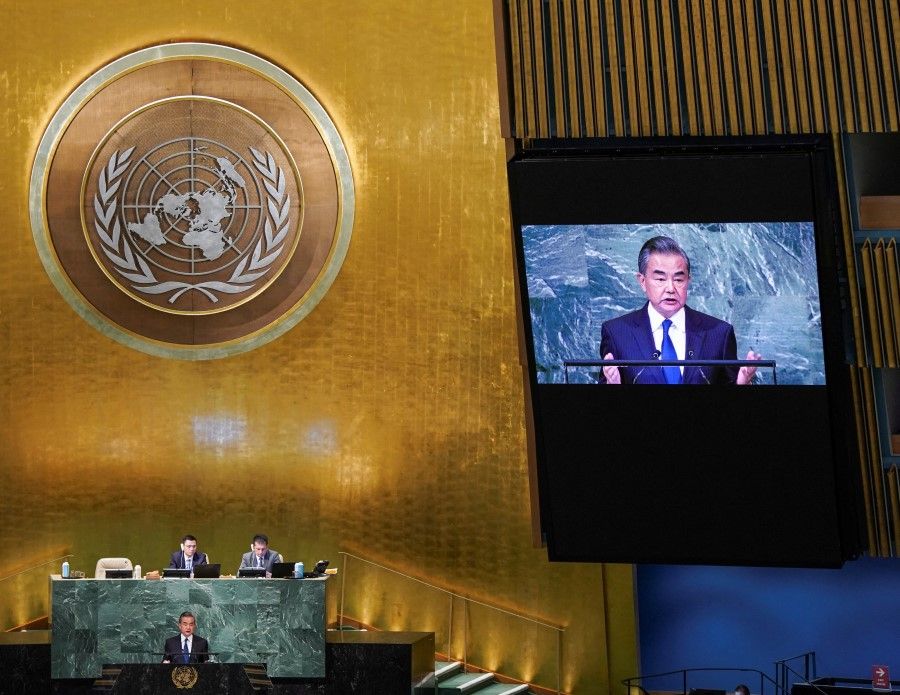China's 'international united front' diplomacy: When staying neutral means a win for China

The 20th Party Congress of the Chinese Community Party (CCP) has become a milestone in the history of the People's Republic of China (PRC). Xi Jinping has been confirmed as the leader of the party-state system for the next five years. It is thereby assumed that Xi will remain the dominant factor shaping China's deeds in the international arena.
Some China watchers suggest that the PRC under Xi's third term of leadership will become more assertive and aggressive. Nevertheless, it should be noted that the goal of Xi's designing and executing international grand strategy has been set since 2013, and the major guideline behind the design, which has not received enough attention outside of China, is the international united front (IUF, 国际统一战线工作 guoji tongyi zhanxian).
From 'lesser enemies' to 'central force'
The IUF is not a newly created concept; it was once the main tool for China to expand its international influence during Mao Zedong's era. The idea behind the IUF was relatively simple: uniting with the lesser enemies to defeat the greater ones.
During Mao's time, the lesser enemies referred to the supporters of either great powers or the Third World nations. To unite with them, China developed a style of improvising to satisfy the target nations' needs, so that these "lesser enemies" could be attracted and willing to work with Beijing.
... under current circumstances, any state or non-state actor could be a central force for China: the only condition is that the actor does not hold a hostile position against Beijing.
The spirit of the IUF remains the guideline for the Chinese management of foreign relations, albeit the discussion of the term was less popular after the end of Mao's rule. The term regained prominence when Xi took over the party leadership. Nevertheless, the targets of IUF have shifted from "lesser enemies" to "the central force" (中间力量 zhongjian liliang) due to China's need for peaceful development and the change of the international structure (from Cold War to the era of globalisation).
An interesting fact is that Beijing has not clearly defined who or what could be counted as the central force. Therefore, under current circumstances, any state or non-state actor could be a central force for China: the only condition is that the actor does not hold a hostile position against Beijing.

Seeking a common denominator
One of the crucial principles of executing the IUF is to gain the support of the central force. The Chinese policymakers are well aware that most states' foreign policy makings do not follow the principle of dichotomy; rather, states always share common interests to a certain degree and conflict with each other due to all kinds of idiosyncratic reasons.
...the IUF allows Beijing to value that the central force's not choosing sides is a temporary victory already.
The IUF encourages the Chinese leaders to focus on emphasising the common interests with the central force nations, while minimising or even ignoring the heterogeneity which might hinder the development of bilateral relationships between China and these nations. The main purpose of doing so is to increase China's sphere of influence and create a favourable external environment for the continuing development/rise of China.
Yet the spirit of the IUF also urges the Chinese leaders to be pragmatic. It means: merely by making each central force nation remain in its neutral position (i.e. not choosing sides and not opposing China publicly), the Chinese leaders take it as a win for China.
In other words, although China's ultimate goal is to win over the central forces and expand its global influence comprehensively, the IUF allows Beijing to value that the central force's not choosing sides is a temporary victory already. This is why since the launch of the Belt and Road Initiative (BRI), Beijing has never publicly negated or opposed the member states' participation in other economic integration programmes dominated by the Western great powers.
The BRI in its essence is a multilateral setting established on multiple sets of bilateral relations and cooperation projects between China and the member states. It is full of flexibility and aims to create inclusiveness and connectivity for Beijing to strengthen its relations with these nations, which is a typical representation of the spirit of the IUF.
... China has been quite calm about Japan providing maritime capacity-building assistance for Vietnam, despite the South China Sea dispute between Beijing and Hanoi.

Options for Southeast Asia
For the Southeast Asian states, being part of the BRI does not mean they cannot continue to take part in other international institutions initiated or led by Washington. Furthermore, even in non-economic spheres, Beijing mostly follows the guideline of IUF and allows the Southeast Asian nations to maintain the position of not choosing sides.
For instance, China has been quite calm about Japan providing maritime capacity-building assistance for Vietnam, despite the South China Sea dispute between Beijing and Hanoi. In addition, despite the two sides' strong stances on the sovereign rights issue, China and Vietnam were still able to conduct joint patrols in the Gulf of Tonkin twice this year.
Such acts by Beijing have to be understood through the logic of the IUF, which emphasises the importance of keeping flexibility and improvising favourable conditions in order to eliminate unfavourable possible outcomes.

Vietnam is viewed by China as a central force. Hanoi declined Washington's invitation to participate in the US-led Rim of the Pacific Exercise twice (in 2020 and 2022); nevertheless, this does not mean Vietnam is veering toward China. Hanoi is at the same time strengthening bilateral defence cooperation ties with Washington through the continuation of the Vietnam-US defence dialogue. This shows its clear stance of not choosing sides.
Even those states that still have quarrels with China could easily find opportunities to reclaim and reemphasise their common interests with Beijing and leave their disagreements aside temporarily.
Not just Vietnam, for many countries which are labelled by Beijing as the central forces, China's logic of IUF is actually quite appealing. Even those states that still have quarrels with China could easily find opportunities to reclaim and reemphasise their common interests with Beijing and leave their disagreements aside temporarily. They would find that Beijing normally takes the deal, yet the premise is that the bargain must have been done bilaterally.
For China, the central force nations' remaining neutral and not siding with its rival is a win, because this means the bilateral relations between them and China remain stable. Hence China can predict that the potential harms, if any, that these states may cause, are limited and can be anticipated, especially in the era when the rivalry with the US is clearly intensified. Beijing would certainly wish to minimise the hostility in the external environment as much as possible.
Such a mentality will continue to dominate Chinese foreign policymaking after Xi Jinping begins his third term as the party leader. After all, according to the political report of the 20th Party Congress of the CCP, Xi claimed that the promotion of a "community with a shared future for mankind" remains the priority of his goal of managing foreign relations. In that regard, the guiding principle is still the IUF, nothing else.
Related: [Future of China] China's BRI seems irreplaceable, for now | [Future of China] China's ten-year-old BRI needs a revamp | China's slowing economy will not deter BRI outreach | China's pragmatic party diplomacy in Southeast Asia | China's Islamic diplomacy in Indonesia is seeing results | China's CPC deepens ties with Philippine political parties | What's new in Xi Jinping's 20th Party Congress report | Implications of Xi Jinping resuming overseas trips before 20th Party Congress | Beijing faces a huge deficit of trust after 20th Party Congress
